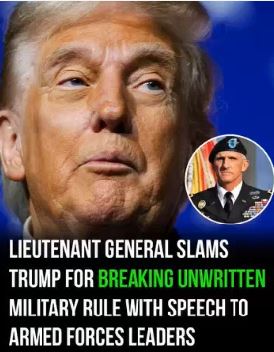
When senior U.S. military leaders from across the globe were unexpectedly called to Virginia for a last-minute meeting, the move quickly drew attention. Hundreds of top commanders from Europe, the Middle East, and Asia were suddenly ordered to return, prompting speculation about potential policy shifts or leadership changes. The interest only deepened when it became known that former President Donald Trump would address the group, adding a layer of uncertainty as officials arrived at Marine Corps Base Quantico. The mood was tense, with many anticipating announcements that could influence the future direction of U.S. defense strategy.
During the meeting, Secretary of War Pete Hegseth outlined his priorities with firm clarity, focusing on readiness, discipline, and physical fitness within the ranks. He emphasized traditional military standards and expressed skepticism toward several initiatives linked to previous administrations, urging a renewed focus on what he described as foundational values. While some leaders welcomed his direct approach, others found the tone unexpectedly political. One defense official later commented that it “felt more like a public address than a confidential briefing,” noting that it occurred while global operations were ongoing
Security analysts also voiced concern about the logistics, questioning the wisdom of gathering so many high-ranking officials in one place at a known time. Critics suggested that such a concentration of military leadership carried strategic risk and could expose vulnerabilities. Afterward, discussions among retired officials and defense experts centered on how the event balanced lawful orders, professional standards, and the nonpartisan traditions that guide the U.S. military.
Retired Lt. Gen. Mark Hertling, who spoke publicly, emphasized that officers are trained to execute legal, ethical orders and reject any that fall outside those boundaries. He noted that many topics discussed — such as improving readiness and physical conditioning — align with standard military priorities. However, he stressed the importance of communication, transparency, and maintaining trust between the military and the public. Referencing a long-standing leadership rule — “praise in public, correct in private” — Hertling suggested the meeting may have tested that balance. In the coming days, he predicted, commanders would likely work to clarify expectations, reaffirm professional ethics, and reinforce the military’s duty to the Constitution above all else.